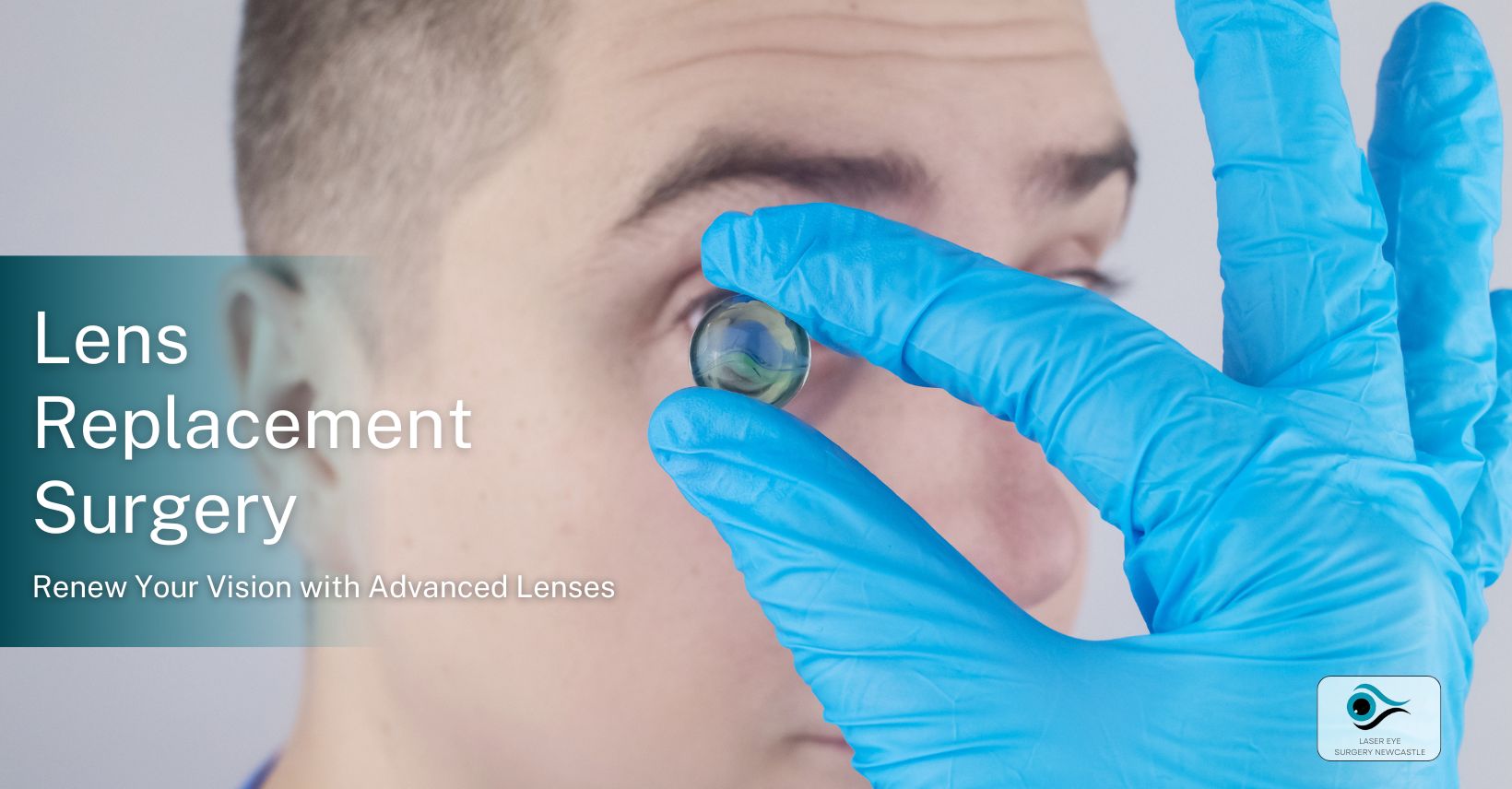Are you tired of constantly relying on glasses or contacts to see clearly?
Lens replacement surgery may be the solution you’ve been looking for.
In this comprehensive guide, we will explore the different types of procedures, the benefits of the surgery, and what to expect during the recovery process.
From improved vision to reduced dependence on corrective eyewear, lens replacement surgery offers a life-changing opportunity to renew your vision with advanced lenses.
Let’s dive in and learn more about this procedure.
What Is Lens Replacement Surgery?

Lens replacement surgery involves removing the eye’s natural lens and replacing it with an artificial intraocular lens to enhance vision clarity.
This surgery, targeting conditions like cataracts or presbyopia, involves removing the natural lens and replacing it with an artificial intraocular lens (IOL). These IOLs vary in design to meet different vision needs: multifocal lenses enhance near and distance vision, while toric lenses correct astigmatism. Each lens type offers amazing benefits, setting the stage for our next discussion on the different types of lens replacement surgery.
What Are The Different Types Of Lens Replacement Surgery?
Several lens replacement surgeries address distinct vision correction needs, including refractive lens exchange and cataract surgery.
Refractive lens exchange (RLE) is typically chosen by individuals who seek to reduce their dependence on glasses or contact lenses, even if they do not have cataracts. On the other hand, cataract surgery is primarily performed to remove a cloudy lens and replace it with an artificial one. LASIK, a popular laser eye surgery, can sometimes be seen as a complementary procedure to RLE or cataract surgery for individuals who desire further vision enhancement or refinement after the primary surgery.
What Are The Benefits Of Lens Replacement Surgery?
Lens replacement surgery provides several advantages, such as enhanced vision quality, decreased reliance on glasses or other visual aids, and an effective solution for eye conditions like cataracts and presbyopia. These improvements are pivotal for those seeking a clearer vision and a higher quality of life. Next, we will explore the different types of lens replacement surgery available, which further create these benefits to individual patient needs.
Improved Vision
One of the primary benefits of lens replacement surgery is the substantial improvement in vision clarity, especially for distance vision, as facilitated by a skilled eye surgeon.
- During the procedure, the eye surgeon replaces the natural lens with an artificial intraocular lens (IOL) to correct refractive errors.
- This implantation improves the eye’s focusing power, allowing for sharper and more precise vision at various distances.
- The surgeon’s expertise in selecting the most suitable lens for the patient’s individual visual needs greatly influences the post-operative results.
Reduced Dependence On Glasses Or Contacts
Lens replacement surgery significantly reduces the need for spectacles or contact lenses by incorporating artificial lenses, such as multifocal lenses, to correct various vision impairments.
These multifocal lenses address presbyopia, astigmatism, and other refractive errors that can impact clear vision.
By utilising multifocal technology, individuals can experience improved vision at multiple distances, including near, intermediate, and far, without the constant hassle of shifting between glasses for different activities.
Patients who undergo lens replacement surgery with multifocal lenses often find themselves significantly less dependent on traditional corrective eyewear in their daily lives.
Treatment For Cataracts
Lens replacement surgery is a highly effective treatment for cataracts, where the natural lens affected by cataracts is removed and replaced with a clear artificial lens during the cataract operation.
This surgical procedure is typically done on an outpatient basis and is known for its quick recovery time. Patients often experience improved vision immediately after the procedure, with optimal results seen within a few weeks. Common symptoms of cataracts, such as blurry vision, sensitivity to light, and difficulty seeing at night, are alleviated post-surgery.
Lens replacement surgery significantly enhances vision clarity and overall quality of life, freeing individuals from the limitations imposed by cataracts. This improvement enables them to engage in their daily activities and hobbies fully. Understanding these benefits is important when considering who might be the ideal candidate for this procedure, which we will explore in the next section.
Who Is A Good Candidate For Lens Replacement Surgery?

To ensure optimal outcomes from lens replacement surgery, suitable candidates must be selected based on age, eye health, and overall health evaluations. These assessments are key to determining who will benefit most from the procedure. Now, let’s explore the exact factors that define who is a good candidate for lens replacement surgery.
Age
Age is a critical factor in lens replacement surgery eligibility, with conditions like presbyopia and hyperopia often making older patients ideal candidates.
Individuals in their 40s and above are the most common age groups seeking lens replacement surgery. Beyond the age of 40, the natural ageing process affects the flexibility and focusing ability of the eye lens, leading to increased presbyopia.
Older adults, typically 60 and above, are prone to hyperopia, commonly known as farsightedness. This condition makes it challenging to see objects up close, impacting daily activities like reading and using electronic devices.
Eye Health
Good eye health, including a healthy cornea and absence of severe dry eye or astigmatism, is essential for successful lens replacement surgery. A healthy cornea is important as the eye’s clear front surface helps focus light, allowing you to see clearly. Dry eye symptoms can cause discomfort and affect vision quality, so managing them before surgery is vital for optimal results. Addressing astigmatism beforehand ensures that the cornea’s curvature is uniform, leading to better post-surgery visual outcomes. Eye health evaluations before the procedure help identify any issues that could impact the surgery’s success, allowing for proper intervention if needed.
Overall Health
Overall, health plays a important role in lens replacement surgery, as patients must be in good general health to minimise surgery risks and ensure a smooth recovery process.
During the consultation phase, health evaluations are typically conducted to assess factors such as cardiovascular health, diabetes management, and any underlying medical conditions. These assessments help the surgeon determine the potential risks associated with the procedure and make informed decisions about the patient’s candidacy for surgery.
Patients with unmanaged conditions like high blood pressure or diabetes may experience higher risks during and after lens replacement surgery. Maintaining a healthy lifestyle and adhering to medical advice to minimize these risks effectively is essential. This approach is vital for optimizing surgical outcomes, which we will explore further in the following section on the risks of lens replacement surgery.
What Are The Risks Of Lens Replacement Surgery?
Whilst lens replacement surgery is generally safe, it is important to know the potential risks below, such as infection, inflammation, and retinal detachment, which can impact the surgery’s outcomes and long-term stability.
Infection
Infection is a potential risk of any surgical procedure, including lens replacement surgery, and it is important to follow pre- and post-surgery instructions provided during the consultation to minimise this risk.
Various factors can cause infection during surgical procedures, such as introducing bacteria or other pathogens into the surgical site. The body’s natural defences may be compromised during surgery, making it more susceptible to infections. To prevent such complications, careful hygiene practices are followed in the operating theatre, including sterilising equipment and maintaining a sterile environment.
Before surgery, patients are often advised to avoid certain medications or activities that could increase the risk of infection. Adhering to these guidelines is important to ensuring a successful outcome.
Inflammation

Inflammation can occur as a response to eye surgery, but it is typically manageable with post-surgery medications and proper care.
Common symptoms of inflammation after eye surgery include redness, swelling, pain, and sometimes blurred vision. It is important to follow the prescribed treatment plan, which often includes anti-inflammatory medications and antibiotic eye drops. Properly managing inflammation is essential to prevent complications and promote healing. Attending follow-up appointments with your eye surgeon is vital to promptly monitor the healing process and address any signs of persistent inflammation.
Bleeding
Bleeding is a rare but possible risk associated with lens replacement surgery, and the eye surgeon must manage this risk during the procedure.
Bleeding may occur during surgery due to various factors, such as injury to blood vessels or underlying health conditions. In managing bleeding, the surgeon carefully monitors the surgical site for any signs of excessive bleeding and takes immediate steps to control it, which may include using cauterisation, sutures, or special haemostatic agents.
To minimise the risk of bleeding, preoperative assessments are conducted to identify any potential issues that could increase the chances of bleeding during surgery. Surgeons may utilise particular surgical techniques, such as gentle tissue handling and precise incisions, to reduce the likelihood of bleeding complications.
Retinal Detachment
Retinal detachment is a serious but uncommon risk of lens replacement surgery that can affect vision outcomes if not promptly addressed.
Some signs and symptoms of retinal detachment include sudden flashes of light, floaters in your vision, or a curtain-like shadow over your visual field. If left untreated, retinal detachment can progress rapidly, leading to permanent vision loss.
Early treatment is essential as it helps prevent further damage to the retina and enhances the chances of vision restoration. Promptly addressing symptoms associated with retinal issues is key to avoiding severe complications and maintaining eye health. This proactive approach to eye care underlines the importance of preparing thoroughly for procedures like lens replacement surgery, which we will discuss next.
How To Prepare For Lens Replacement Surgery?
Preparing for lens replacement surgery involves several important steps, including:
- A thorough consultation with an ophthalmologist
- Following pre-surgery instructions
- Making necessary medication adjustments to ensure a smooth procedure
Consultation With An Ophthalmologist
A comprehensive consultation with an ophthalmologist is essential to assess eye health, discuss surgery costs, and plan the procedure with the eye surgeon.
During the consultation, the ophthalmologist will thoroughly evaluate your eye health to determine the best action for your needs. This may include vision tests, examinations of the eye structures, and discussing any potential risks or complications. You and the eye surgeon will engage in detailed discussions regarding the financial aspects of the surgery, ensuring full transparency and understanding of the costs involved.
Pre-Operation Instructions
Following pre-surgery instructions is important to ensure the successful implantation of the artificial lens during the procedure.
Adhere to the exact guidelines provided by your healthcare team before the surgery. One important instruction is to fast for a certain period before the surgery to prevent any complications related to anaesthesia. You may need to stop taking certain medications, especially blood thinners, to minimise the risk of excessive bleeding during the procedure. Maintaining good hygiene practices, such as taking a thorough shower with antiseptic soap on the day of surgery, can help reduce the risk of infections post-surgery.
Medication Adjustments
As advised during the consultation, medication adjustments are necessary to minimise surgery risks and ensure a safe procedure.
During the consultation, the medical team evaluates the patient’s medications to identify any that might cause complications during surgery. Adjustments or temporary discontinuation of certain drugs may be necessary to minimize surgical risks. This approach enhances the patient’s safety and well-being throughout the surgical experience. Understanding and adjusting medications as part of the preparation is vital for a smooth transition into the recovery process after lens replacement surgery.
What Is The Recovery Process After Lens Replacement Surgery?
The recovery process after lens replacement surgery involves careful adherence to post-surgery instructions, attending follow-up appointments, and allowing adequate healing time to ensure optimal vision correction outcomes.
Post-Surgery Instructions
Adhering to post-surgery instructions ensures stability and success after eye surgery.
Following the prescribed medication regime is vital to prevent infection and aid healing. It’s important to strictly adhere to the dosage and timing as instructed by the medical team.
Activity restrictions, such as avoiding strenuous exercise and lifting heavy objects, help protect the eye from potential strain or injury during the initial recovery period.
Proper eye care practices, including using prescribed eye drops, wearing protective eyewear, and avoiding rubbing the eyes, play an important role in maintaining the surgical outcome and preventing complications.
Follow-Up Appointments
Regular follow-up appointments are essential to monitor healing and ensure optimal vision quality and surgery outcomes.
During these follow-up appointments, the eye care team will assess your progress post-surgery, evaluate any potential complications, and make necessary adjustments to your treatment plan. These visits also allow patients to address concerns or queries about their recovery process or vision improvement. The frequency of these appointments varies depending on individual circumstances and the type of surgery performed.
During follow-up visits, patients can expect to undergo various tests, such as visual acuity tests, intraocular pressure measurements, and ocular health evaluations. These examinations help track the eyes’ ongoing health and detect any issues early to prevent further complications. By diligently attending these appointments and following the prescribed care instructions, patients can actively contribute to the successful outcome of their surgery and the preservation of their vision.
Healing Time
The healing time after eye surgery varies but typically spans several weeks, during which vision correction continues to improve.
Healing after eye surgery follows a general timeline that helps patients understand what to expect.
Patients may experience discomfort, light sensitivity, and blurry vision in the initial stage, lasting a few days. This is normal as the eyes start to heal and adjust. Within the next few weeks, vision gradually sharpens as the eyes recover. The final stage, which can last up to several months, allows for complete healing and stabilisation of vision. Factors such as age, overall health, and the exact type of surgery can influence the recovery rate. It is important for patients to strictly adhere to post-operative care instructions provided by their healthcare provider to ensure optimal healing and outcomes.
Final Overview: Making an Informed Decision on Lens Replacement Surgery
Making an informed decision on lens replacement surgery involves understanding the different lens types, considering the role of health insurance, and evaluating potential outcomes to ensure the best vision correction solution.
When choosing a lens type, patients must comprehend the distinctions between monofocal, multifocal, and toric lenses to select the most suitable option based on their needs. Health insurance coverage plays an important role in determining the overall cost of the surgery, impacting individuals’ finances. Patients must discuss insurance details with their surgeon to be well-prepared financially.
Evaluating the potential outcomes of the surgery is vital in setting realistic expectations and understanding the benefits that lens replacement can provide. By consulting with their eye surgeon and asking relevant questions, patients can make informed decisions about their individual circumstances. Find here for more details.






